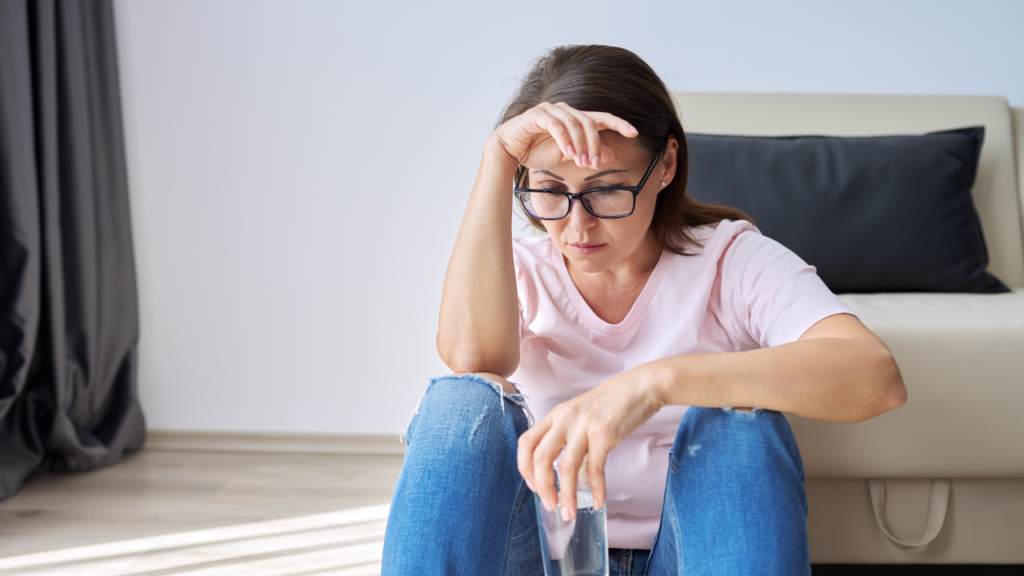
You’re considered to be in menopause when you haven’t had a period for a whole year.If you are experiencing menopause, you are not alone. Millions of women go through this natural transition in life, that can happen in their 40s or 50s, but most women reach menopause around age 51. Menopause isn’t an illness, but it can bring challenges like forgetfulness, irritability, hot flashes, night sweats, and weight gain. The good news is that we can do things to make these symptoms better or less bothersome. In this article, we will explore 7 natural menopause treatments that work.
What are the 34 symptoms of menopause?
Menopause symptoms can make women feel chaotic inside or like they are going crazy, not themselves, due to the emotional and cognitive processing fluctuations they might have. These symptoms can affect the quality of work, productivity, and care of loved ones, and even make women think about changing their careers.
Menopause occurs when you go without a period for 12 consecutive months because your ovaries stop releasing eggs, leading to a decrease in the production of estrogen and progesterone. This marks the conclusion of a woman’s reproductive capability. More than 70% of women experience the symptoms of menopause because estrogen levels drop. Before menopause, there’s a period called perimenopause when your ovaries start being less consistent with releasing an egg, and it happens a few years before your final period. Some common symptoms that can occur with menopause include:
- Night Sweats
- Hot flashes
- Mood swings
- Irregular Menstrual Cycle
- Decreased Libido
- Breast Soreness
- Vaginal Dryness
- Tingling Hands and Feet
- Headaches
- Changes in Sense of Taste
- Burning Sensation in the Mouth
- Bloating
- Fatigue
- Joint Pain
- Different Digestive Changes
- Sensations of Electric Shock
- Muscle Aches and Tension
- Sleep Issues
- Itchiness
- Memory Problems
- Concentration Challenges
- Brittle Nails
- Thinning Hair
- Sudden Urge to Urinate
- Weight Gain
- Allergies
- Occasional Dizziness
- Irregular Heartbeat
- Depression
- Irritability
- Boosted Body Odor
- Panic Disorder
- Anxiety
- Osteoporosis
How do you manage menopause symptoms at work?
Menopausal symptoms can negatively impact women’s work performance. The stage of menopause a woman is in, along with the specific symptoms she experiences, can affect how well she functions at her job.
For instance, women amid menopause commonly face issues with sleep, which can disrupt their daytime performance, due to difficulties in concentration and productivity. Muscle and bone pain is a significant problem for women going through menopause. The amount of pain can change based on the stage of menopause and a woman’s age.
Naturopathic doctors at Make Care Health can help you manage your symptoms of menopause and post-menopause by using a holistic approach to balancing hormones, through nutrition guidance, suggesting supplements that help balance hormones and support the limited production of estrogen and progesterone in your body.
Using bioidentical hormone therapy can be a preventive approach to reduce damage and difficulties caused by decreased hormone production. They offer education about menopause and its associated changes, helping women understand what to expect and how to navigate this life stage more effectively.
Navigating Joint Pain During Menopause
Women who have already completed menopause may frequently experience discomfort in their muscles and joints, which can also affect their work. Their bodies have estrogen receptors all over, even in the joints. When hormone levels go down, it can make pain worse, especially from inflammation, regular wear and tear, and getting older.
More than half of women experience joint pain, called arthralgia, during menopause. It can be tricky to figure out why women in menopause have joint pain because this time also sees more cases of long-term joint conditions like osteoarthritis. But, joint pain does seem to go up during menopausal changes, mainly because estrogen levels go down.
Similar pain can happen when women suddenly stop hormone replacement therapy or use aromatase inhibitors. We know that hormones and pain processes, immune cells, and joint cells interact, but more research is needed. Right now, there isn’t a specific treatment for menopausal joint pain, but some things might help.
Hormone replacement therapy (HRT) can ease joint pain during menopausal changes, especially if there are other distressing symptoms. Encouraging weight loss, simple pain relief, and regular exercise can also be useful, especially for women with osteoarthritis. Lastly, it’s important to address other things linked to chronic pain and menopausal changes, like fatigue, poor sleep, sexual issues, and feeling down.
Menopause benefits at work
For many women, natural menopause happens around age 51 Their symptoms are often thought to be because of hormone changes as women age, but other things can also affect them. At work, going through menopause is a big deal for women.
Our naturopathic doctor suggests promoting good health, improving workspaces, and having fair work rules to make it easier for women. Also, it’s a good idea to give people menopause awareness. These changes can help women handle menopause better and keep doing well at their jobs because more and more women worldwide are working.
According to research in Europe, for instance, 42.0% of the workers are women. There has been an increase in adult women working, from about 3.9 million in 1990 to around 5.5 million in 2008 in Egypt. This shows that more women are contributing to the workforce. In recent years, women are stayed in their jobs longer. One reason is financial pressures, and another is that people live, and fewer children are born. In places like the UK, over 2.5 million women workers are between 50 and 59 years old.
In Egypt, many women in the workforce are between 40 and 64 years old. Both in Egypt and Europe, women are working for more extended periods. To help employees during perimenopause and menopause, some companies now offer unique benefits. These benefits can include the following:
- Flexible work options are available. You can work from home, part-time, or change your work hours. It helps you manage your symptoms and reduce stress.
- To help you learn more about your symptoms, educational support provides trusted online resources and how to deal with them.
- Virtual healthcare offers online doctor visits so you can get help with menopause from the comfort of your home.
- Menopause can be tough emotionally, so companies can connect you with mental health experts to guide you through this time.
7 Natural menopause treatments that work at home

A holistic way to deal with menopause means caring for physical, psychological, and social needs while planning therapy. Eating a nutritious diet rich in fruits, protein, and vegetables and getting regular physical activity can reduce the symptoms of menopause. Here are 7 ways research identified you can feel better during menopause:
Vitamin D and Calcium
Vitamin D and Calcium
During menopause, hormonal changes can increase the risk of osteoporosis and cause bone weakness. Getting enough Vitamin D and calcium is crucial because they are linked to good boon health. During postmenopause, intake of enough amount of vitamin D can lower the risk of hip fractures from weak bones.
The things your bones need to stay strong aren’t only vitamin D but also calcium, magnesium, and potassium. To make sure you get enough calcium, try to eat 6-8 cups of vegetables every day. If that’s not possible, you can also consider having dairy products. Dairy foods include yogurt, milk, and hard and soft cheeses, from either cow, sheep, or goats. Vegetables like kale, okra, spinach, basil, thyme, sage, rosemary, collard greens, tofu, beans, and sardines are rich in calcium. Also, some foods like certain cereals, fruit juices, or milk alternatives have extra calcium added to them.
Your skin can create vitamin D when it’s in the sun for a specific amount of time. But because of our usual North American lifestyle and climate, we don’t always get enough sun exposure. In that case, you might need to take a vitamin D supplement.
To figure out how much vitamin D you need, it’s essential to get a vitamin D test every year, usually in October to get ready for winter. When you talk to your naturopathic doctor or join our Confident Hormone Club, they can help you figure out the right amount of vitamin D to take if your levels are low. They can also suggest foods that can help you keep a good amount of vitamin D in your body. Foods like oily fish, eggs, cod liver oil, and some foods that have extra vitamin D added to them can help with this.
Keeping a Healthy Weight During Menopause
Many women tend to gain weight during menopause. This can happen because of different reasons like changing hormones, getting older, how you live, and what’s in your genes. Gaining too much body fat, especially around your waist, can raise the chances of getting health problems like hypertension, heart disease, and diabetes. Also, your weight can affect how bad your menopause symptoms feel. So, if you can keep a healthy weight, it might make your menopause symptoms feel better and help you stay healthier.
Phytoestrogens
Phytoestrogens are like estrogen in our body and come from plants. You can find them in tofu, tempeh, flaxseed, and sesame seeds. They reduce menopause symptoms by attaching to estrogen receptors that are not getting attached when estrogen levels drop.
Herbs
Add herbs and vegetables to your diet to get enough fiber or multivitamins to boost your health. Some herbs like black cohosh or red clover may help alleviate hot flashes.
Acupuncture
Acupuncture has been shown to reduce hot flashes in some women. Confident Hormone Club, you will learn acupuncture.
Mind-body therapies
Doing yoga or meditation can help make you feel less stressed and better overall.
Supplements
Trying omega-3 fatty acids or probiotics could make menopause symptoms feel better.
Can a woman have an orgasm after menopause?
Of course, you can still have an orgasm even after menopause. You can still have enjoyable sex, even after menopause. Simple adjustments can make it more fun when alone or with a partner. This can improve the physical and emotional closeness you share with your partner.
Menopause supplements
- One-a-Day Women’s Menopause Multivitamin
- Theralogix IsoRel Whole Soybean Extract Supplement
- Now D3 + k2
- New Chapter One Daily Every Woman’s Multivitamin 40+
- Nutrafol Women’s Balance
- Femquil
- Remifemin Menopause Relief

